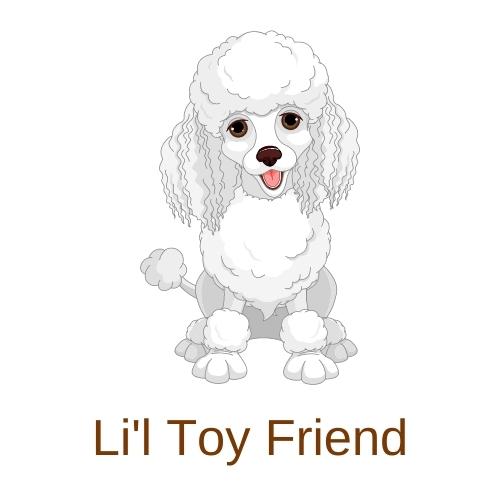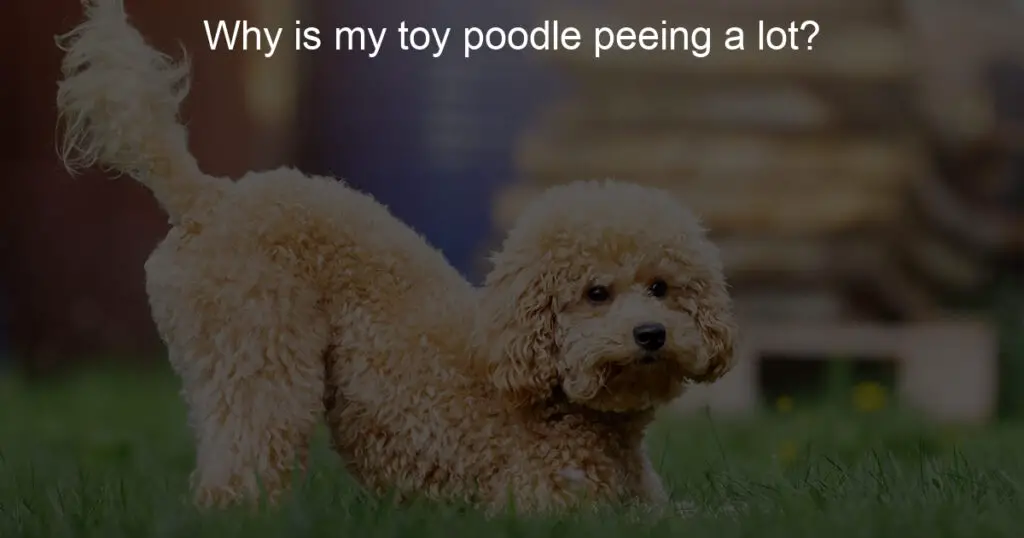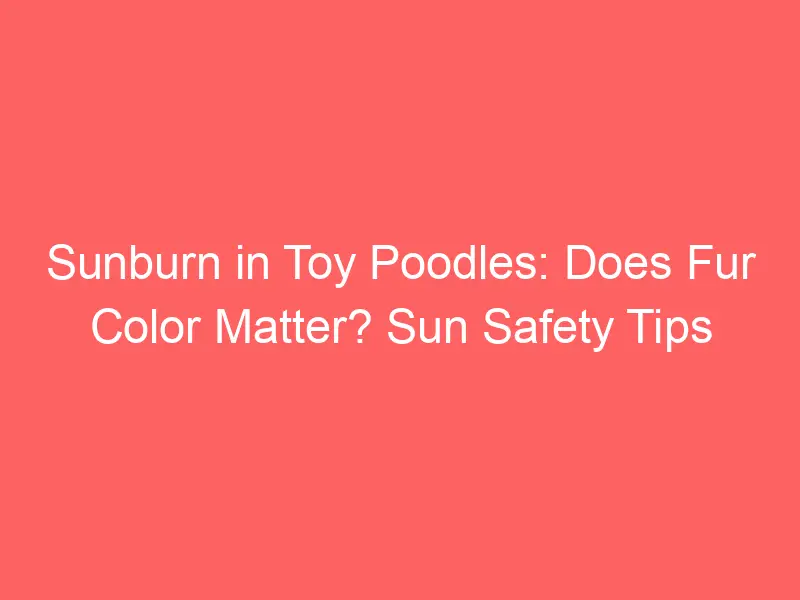Introduction: Toy Poodle Health Issues

As a toy poodle owner, it’s crucial to understand the health issues that your furry friend may face. This knowledge will help you provide the best care possible for your pet, ensuring they live a long, happy, and healthy life. In this article, we’ll explore some of the most common health concerns for toy poodles and discuss why it’s so important to understand your pet’s health.
-
- Overview of Common Toy Poodle Health Concerns
Toy poodles are known for their intelligence, energy, and affectionate nature. However, like all breeds, they are prone to certain health issues. Some of the most common include:
-
-
- Patellar Luxation: This condition, common in small dogs, occurs when the dog’s kneecap is dislocated from its normal position. It can cause pain and mobility issues.
- Progressive Retinal Atrophy (PRA): PRA is an eye disorder that eventually causes blindness. Early detection can help manage this condition.
- Hip Dysplasia: This is a genetic condition where the hip joint doesn’t fit together properly, leading to arthritis or difficulty walking.
-
These are just a few examples. Regular check-ups with your vet can help detect these conditions early and manage them effectively.
-
- Importance of Understanding Your Toy Poodle’s Health
Understanding your toy poodle’s health is vital for several reasons. Firstly, it allows you to recognize the signs of common health issues early, leading to quicker treatment and better outcomes. Secondly, it helps you make informed decisions about your pet’s care, from diet and exercise to medical treatments. Finally, it enables you to provide a high quality of life for your pet, ensuring they are comfortable, happy, and able to enjoy their time with you to the fullest.
In the following sections, we will delve deeper into specific health issues, such as frequent urination in dogs, and provide guidance on managing these conditions. Remember, a healthy toy poodle is a happy toy poodle!
Understanding Frequent Urination in Dogs
One of the common health issues that dogs, particularly Toy Poodles, may experience is frequent urination. It’s crucial to understand what this means and how to measure it to ensure your pet’s health and well-being.
What is considered frequent urination?
Frequent urination in dogs is not just about the number of times your dog goes for a pee. It also involves observing any changes in your dog’s regular urination pattern. Let’s delve into this a bit more.
- Definition of frequent urination in dogs: Frequent urination, also known as polyuria, is when a dog urinates more often than usual. It’s not about the volume of urine but the frequency. If your dog is going out to pee more than 4-5 times a day, it could be a sign of frequent urination. However, keep in mind that every dog is different, and what is normal for one dog might not be for another. Wikipedia offers a comprehensive explanation on this subject.
- How to measure your dog’s urination frequency: Start by observing your dog’s regular urination pattern for a few days. Note down the number of times your dog urinates each day. If you notice a sudden increase in this number, it might be a sign of frequent urination. It’s also important to observe if your dog is straining while peeing or if there’s a change in the color or smell of the urine. These could be signs of a urinary tract infection or other health issues.
Understanding frequent urination in dogs is the first step towards ensuring their health and happiness. If you notice any changes in your dog’s urination pattern, it’s best to consult with a vet immediately.
Causes of Excessive Urination in Dogs
Excessive urination in dogs, especially toy poodles, can be a cause for concern. It’s important to understand the potential causes, which can be both medical and behavioral. Let’s delve into these two major categories:
-
- Medical conditions causing excessive peeing in toy poodles
There are several medical conditions that can lead to excessive urination in toy poodles. These include:
-
-
- Urinary Tract Infections (UTIs): UTIs are common in dogs and can cause frequent urination. They are usually caused by bacteria and can be treated with antibiotics. Learn more about UTIs here.
- Diabetes: Just like in humans, dogs can also suffer from diabetes. One of the symptoms of diabetes in dogs is excessive thirst and urination. Read more about diabetes in dogs here.
- Kidney Disease: Kidney disease can also cause frequent urination in dogs. This is because the kidneys are unable to concentrate urine, leading to more frequent urination. Find more information on kidney disease in dogs here.
- Behavioral causes of frequent urination
-
Aside from medical conditions, there are also behavioral reasons why your toy poodle might be urinating frequently. These include:
-
- Marking: Dogs, especially males, often urinate to mark their territory. This behavior can increase if there are other dogs in the area or if your dog is feeling anxious.
- Submissive or Excitement Urination: Some dogs may urinate when they are overly excited or feeling submissive. This is more common in puppies but can occur in adult dogs as well.
- Separation Anxiety: Dogs that are left alone for long periods of time may urinate more frequently. This is often a sign of separation anxiety. Learn more about separation anxiety in dogs here.
Understanding the causes of excessive urination can help you better manage your dog’s health and well-being. Always consult with a veterinarian if you notice any changes in your dog’s urination habits.
Poodle Urinary Problems: A Deep Dive
Understanding the urinary health of your toy poodle is crucial for their overall well-being. In this section, we’ll delve into the common reasons why your toy poodle might be peeing more frequently than usual.
Toy Poodle Peeing Frequently: Possible Reasons
There are several reasons why your toy poodle might be urinating more frequently. Here are the most common causes:
- Urinary tract infections in toy poodles: Urinary tract infections (UTIs) are common in dogs, especially toy poodles. These infections occur when bacteria enter the urinary tract, causing inflammation and discomfort. Symptoms include frequent urination, blood in the urine, and discomfort while urinating. If you notice these symptoms, it’s important to consult with your vet immediately. Learn more about UTIs in dogs here.
- Diabetes and its impact on urination: Diabetes is a condition that affects the body’s ability to regulate blood sugar levels. This can lead to excessive thirst and, consequently, frequent urination. If your toy poodle is drinking and urinating more than usual, it could be a sign of diabetes. Regular vet check-ups can help diagnose and manage this condition early. Find more about diabetes in dogs here.
- Effects of aging on urinary frequency: As dogs age, their bodies undergo various changes. One of these changes can be an increase in urinary frequency. This can be due to a decrease in bladder control or the development of age-related diseases. Regular vet visits are essential to monitor your toy poodle’s health as they age. Learn more about aging in dogs here.
Understanding the reasons behind your toy poodle’s frequent urination can help you take the necessary steps to ensure their health and comfort. Always consult with your vet if you notice any changes in your dog’s urination habits.
Toy Poodle Urinary Tract Infection: Symptoms and Treatment
Urinary Tract Infections (UTIs) are a common health problem in Toy Poodles. They can cause discomfort and lead to serious health issues if not treated promptly. In this section, we will discuss how to identify the symptoms of UTIs in Toy Poodles and the methods of diagnosis and treatment.
-
- Identifying symptoms of UTI in dogs
Recognizing the symptoms of a UTI in your Toy Poodle is the first step towards ensuring their health. Some of the common symptoms include:
-
-
- Frequent urination
- Difficulty or pain while urinating
- Blood in the urine
- Unusual urine odor
- Lethargy or decreased appetite
-
If you notice any of these symptoms in your Toy Poodle, it’s important to consult with a veterinarian immediately.
-
- Methods of diagnosis and treatment
Diagnosing a UTI in Toy Poodles involves a series of tests, including a urinalysis and possibly a urine culture. These tests help the vet identify the type of bacteria causing the infection and determine the most effective treatment.
Treatment for UTIs typically involves antibiotics to kill the bacteria causing the infection. Your vet may also recommend dietary changes or supplements to help prevent future UTIs. It’s crucial to follow the vet’s instructions carefully and complete the full course of treatment, even if your Toy Poodle seems to be feeling better.
Remember, early detection and treatment of UTIs can help ensure your Toy Poodle’s health and happiness. Regular vet check-ups and paying attention to any changes in your dog’s behavior or habits can go a long way in preventing urinary problems.
Other Dog Health Problems That Cause Excessive Peeing
While urinary problems are common in Toy Poodles, there are other health issues that can cause excessive peeing in dogs. These include kidney disease, bladder stones, and endocrine disorders. Let’s take a closer look at each of these conditions.
- Kidney disease in dogs
Kidney disease is a serious condition that can affect dogs of all breeds and ages. The kidneys play a vital role in filtering waste from the blood and producing urine. When a dog has kidney disease, their kidneys are not working as well as they should, which can lead to increased urination. According to Wikipedia, kidney disease can be caused by a variety of factors, including age, genetics, and certain medications.
- Bladder stones and their impact on urination
Bladder stones are hard masses of minerals that form in the bladder. These stones can cause a variety of symptoms, including frequent urination, blood in the urine, and pain during urination. In some cases, bladder stones can also lead to urinary tract infections, which can further increase the frequency of urination. According to a Wikipedia article, bladder stones can be caused by a variety of factors, including diet, infection, and certain medications.
- Endocrine disorders causing excessive urination
Endocrine disorders are conditions that affect the body’s endocrine system, which is responsible for producing and regulating hormones. Certain endocrine disorders, such as diabetes and Cushing’s disease, can cause excessive thirst and urination in dogs. According to Wikipedia, these conditions are often caused by an imbalance in the body’s hormone levels, which can be triggered by a variety of factors, including age, genetics, and certain medications.
Understanding the underlying cause of your dog’s excessive peeing is the first step in managing this issue. If you notice any changes in your dog’s urination habits, it’s important to consult with a veterinarian as soon as possible.
Managing Excessive Peeing in Toy Poodles
Excessive peeing in toy poodles can be a cause for concern. However, with the right management techniques, you can ensure that your furry friend stays healthy and happy. Here are some preventive measures you can take to manage this health concern.
Preventive Measures for Poodle Health Concerns
Prevention is always better than cure. By taking some simple preventive measures, you can help your toy poodle avoid excessive peeing and other health concerns. Here are some tips:
- Regular vet check-ups: Regular visits to the vet can help detect any health issues early. The vet can provide a thorough examination and suggest any necessary treatments or preventive measures. Remember, early detection can make a significant difference in the health of your pet.
- Diet and exercise tips: A balanced diet and regular exercise are essential for your poodle’s health. High-quality dog food, rich in nutrients, can help maintain a healthy urinary system. Regular exercise helps keep your poodle fit and can also aid in controlling their bladder. Always consult with your vet for personalized diet and exercise plans.
- Importance of hydration: Proper hydration is crucial for your toy poodle’s urinary health. Ensure your pet has access to fresh water at all times. Hydration helps in flushing out toxins from the body and maintaining a healthy urinary system.
By following these preventive measures, you can help manage excessive peeing in your toy poodle and ensure their overall health and well-being.
Dealing with Frequent Urination: Practical Tips
Excessive urination in toy poodles can be a challenge to manage. However, with a few practical tips, you can effectively deal with this issue. Here are some strategies that can help:
- Training your toy poodle to pee outside:Training your toy poodle to pee outside can be a great way to manage frequent urination. Start by establishing a regular bathroom schedule for your dog. Take your poodle outside every 2-3 hours, and reward them with treats and praise when they pee outside. This will help them associate peeing outside with positive reinforcement. Remember, patience is key when it comes to potty training.
- Using pee pads for indoor urination:If your toy poodle is unable to hold their bladder for long periods, consider using pee pads. These are absorbent pads that can be placed in a designated area in your home. When your dog feels the need to pee, they can go on the pad. This can be particularly useful for older dogs or dogs with health issues that prevent them from going outside frequently. Remember to change the pads regularly to maintain cleanliness.
- Managing night time urination:Night time urination can be a challenge, especially if your toy poodle is unable to hold their bladder all night. Consider limiting your dog’s water intake a few hours before bedtime. Also, ensure they have a final bathroom break just before bed. If your dog continues to have accidents at night, it might be worth discussing with your vet as it could be a sign of a health issue.
Remember, every dog is unique and what works for one might not work for another. It’s important to be patient and consistent in your approach. If you’re struggling to manage your toy poodle’s frequent urination, don’t hesitate to seek advice from a professional dog trainer or your vet.
Conclusion: Ensuring Your Toy Poodle’s Health
As we wrap up this comprehensive guide on toy poodle health, it’s crucial to remember that your pet’s well-being is a top priority. Understanding the various health issues, especially those related to frequent urination, can make a significant difference in your toy poodle’s quality of life.
-
- Recap of the importance of understanding toy poodle health issues
Toy poodles, like any other dog breed, are susceptible to a range of health issues. One of the most common problems they face is frequent urination, which can be a symptom of various underlying health conditions. By understanding these issues, you can ensure early detection and treatment, thereby improving your pet’s health and longevity. It’s also important to remember that a healthy diet, regular exercise, and routine vet check-ups are vital for your toy poodle’s overall well-being.
-
- Final thoughts on managing frequent urination in dogs
Frequent urination in dogs, particularly toy poodles, can be a cause for concern. It’s not just about the inconvenience of cleaning up after your pet more often, but it’s also about their health. Frequent urination could be a sign of urinary tract infections, diabetes, or even kidney disease. Therefore, it’s essential to monitor your pet’s urination patterns and seek veterinary advice if you notice any changes. Remember, early detection and management can help ensure your toy poodle leads a happy and healthy life.
In conclusion, your toy poodle’s health is in your hands. By understanding the potential health issues and taking proactive steps to manage them, you can ensure your furry friend stays healthy and happy for years to come. After all, a healthy dog is a happy dog!














